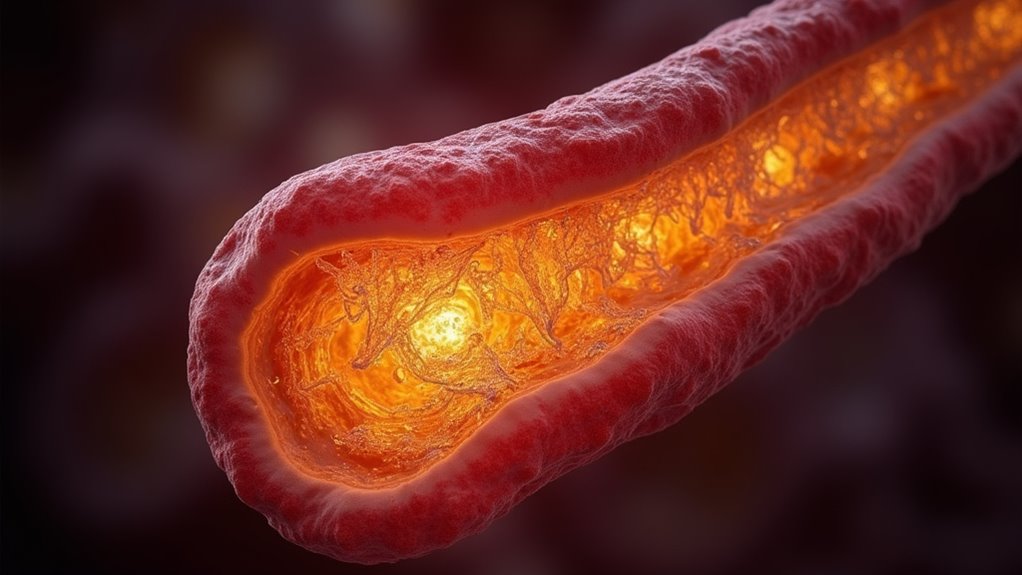Drug use severely impacts your major organ systems through multiple pathways of damage. You’ll experience cardiovascular strain from erratic heart rates and blood pressure spikes, while your lungs face exposure to harmful chemicals and decreased function. Your liver and kidneys struggle to filter toxins, leading to potential organ failure. Your brain suffers cognitive impairment and altered neurotransmitter systems, while your immune response weakens considerably. Understanding these specific effects can help you grasp the full scope of physical harm.
Key Takeaways
- Drugs can severely damage the heart by causing irregular heartbeat, high blood pressure, and increased risk of heart attacks.
- Regular drug use weakens the immune system, making users more vulnerable to infections and diseases.
- Substance abuse damages the liver and kidneys, leading to organ failure and potentially requiring transplants or dialysis.
- Drug use alters brain chemistry, impairing memory, decision-making abilities, and increasing risk of neurological disorders.
- Smoking or inhaling drugs damages lung tissue, reduces breathing capacity, and increases risk of respiratory infections.
Cardiovascular System Complications

When illicit drugs enter your bloodstream, they can cause immediate and long-lasting damage to your cardiovascular system. Your heart rate becomes erratic, often accelerating to dangerous levels, while your blood pressure spikes unpredictably. These sudden fluctuations strain your heart muscle and blood vessels.
You’ll experience constricted arteries, reduced blood flow to essential organs, and potential formation of blood clots. Stimulants like cocaine and methamphetamine are particularly damaging, as they can trigger heart attacks, even in young users. Long-term drug use may lead to weakened heart muscles, damaged blood vessels, and chronic hypertension. You’re also at increased risk for life-threatening arrhythmias, arterial damage, and endocarditis an infection of your heart’s inner lining. The combined effects considerably increase your likelihood of experiencing cardiovascular failure.
Respiratory Health Impacts

Beyond cardiovascular damage, drug use directly compromises your respiratory system through multiple pathways. When you smoke or inhale drugs, you’re exposing your lungs to harmful chemicals and particulates that can trigger asthma exacerbation and chronic inflammation of your airways. Your respiratory defense mechanisms become impaired, making you more susceptible to lung infections and respiratory distress.
Certain drugs, particularly opioids, can greatly slow your breathing rate and reduce oxygen saturation in your blood. This respiratory depression can lead to hypoxia, causing permanent damage to your brain and essential organs. Furthermore, you’ll experience decreased lung capacity, persistent coughing, and compromised ciliary function the natural cleaning mechanism of your airways. Smoking crack cocaine or methamphetamine can cause acute lung injury and potentially fatal pulmonary edema.
Liver and Kidney Damage

Drug-induced hepatotoxicity and nephrotoxicity represent severe threats to your essential organ function. When you consume substances regularly, your liver’s detoxification mechanisms become overwhelmed, potentially leading to liver fibrosis and permanent scarring. Your liver’s ability to filter toxins, process nutrients, and regulate metabolism deteriorates markedly.
Your kidneys face similar risks as they struggle to filter drug metabolites from your bloodstream. Certain substances can crystallize within your urinary tract, forming painful kidney stones and potentially blocking urine flow. You’ll experience reduced kidney function, which compromises your body’s ability to maintain proper fluid balance and remove waste products. The damage to these critical organs often develops silently until you’ve reached advanced stages of organ failure, making early detection essential for preventing irreversible harm.
Brain and Nervous System Effects
As substances cross the blood-brain barrier, they disrupt critical neurotransmitter systems and neural pathways throughout your central nervous system. This interference leads to neurotransmitter imbalance, affecting your brain’s normal communication channels and potentially causing long-term cognitive impairment.
- Your brain’s reward circuit becomes dysregulated, making you less responsive to natural pleasure and more dependent on substances to feel normal
- You’ll experience disrupted memory formation and recall as drugs alter hippocampal function
- Your decision-making abilities diminish due to changes in prefrontal cortex activity
- Your motor coordination deteriorates as substances affect your cerebellum and basal ganglia
These neurological changes can persist long after you’ve stopped using drugs, and some alterations may become permanent without proper medical intervention and rehabilitation.
Digestive System Disorders
When substances enter your digestive tract, they trigger a cascade of harmful physiological reactions that can severely compromise your gastrointestinal health. Drug use disrupts your stomach’s protective mucus layer, often leading to gastric ulcers and chronic inflammation. Opioids slow your digestive motility, while stimulants can cause dangerous spasms throughout your intestinal tract.
You’ll experience significant impairment in nutrient absorption as drugs damage the delicate intestinal villi responsible for extracting crucial compounds from food. This malabsorption typically results in severe nutritional deficiencies, even when you’re maintaining regular eating habits. Furthermore, your liver’s ability to filter toxins becomes overwhelmed, leading to reduced bile production and compromised fat digestion. Chronic drug use can permanently alter your gut microbiome, disrupting the fundamental bacterial balance needed for proper digestion and immune function.
Immune System Suppression
Substance abuse severely compromises your immune system‘s ability to defend against pathogens and maintain cellular health. When you regularly consume drugs, you’ll experience a significant reduction in your body’s natural immune response, making you more vulnerable to diseases and chronic infections.
Drug abuse weakens your immune defenses, leaving your body vulnerable to infections and diseases while disrupting normal cellular function.
Here’s how drugs weaken your immune system:
- Your white blood cells become less effective at identifying and destroying harmful bacteria, viruses, and cancer cells
- You’ll produce fewer antibodies, reducing your body’s ability to remember and fight off previously encountered pathogens
- Your inflammatory responses become dysregulated, leading to increased susceptibility to autoimmune disorders
- Your body’s natural killer cells lose their ability to effectively eliminate infected or abnormal cells
These immunological impairments can persist long after you’ve stopped using drugs, potentially leading to lasting health consequences.
Muscular and Skeletal Changes
Drug abuse triggers profound alterations in your musculoskeletal system, leading to both acute and chronic degenerative changes. You’ll experience muscle atrophy as substances interfere with protein synthesis and nutrient absorption, causing your muscles to weaken and waste away. Long-term drug use disrupts your body’s ability to maintain bone density and repair tissue damage.
Your joints become particularly vulnerable during substance abuse. Joint deterioration accelerates as drugs impair blood flow and reduce the production of synovial fluid, essential for cushioning and lubrication. You’ll notice decreased mobility, increased stiffness, and chronic pain. Injectable drugs can cause localized tissue death and permanent muscle damage. Moreover, your spine may develop premature degenerative conditions, and you’ll face an increased risk of fractures due to compromised bone integrity.
Skin and Dental Deterioration
Through prolonged exposure to illicit substances, your skin and oral tissues undergo severe deterioration that manifests in multiple ways. Drug use greatly impacts your skin conditions and dental hygiene, leading to accelerated aging and permanent damage.
- Your skin’s elasticity decreases rapidly, causing premature wrinkles, while blood vessels near the surface become damaged and create visible track marks and persistent scarring.
- You’ll experience chronic acne outbreaks, skin infections, and hyperpigmentation due to hormonal imbalances and compromised immune function.
- Your teeth develop severe decay and erosion from reduced saliva production and poor dental hygiene habits associated with drug use.
- Your gums become infected and recede, leading to tooth loss, while grinding and clenching behaviors caused by stimulants further damage your dental structure.
Long-Term Organ System Damage
Beyond external deterioration, prolonged drug abuse inflicts devastating consequences on your internal organ systems. Your liver, kidneys, heart, and brain suffer cumulative damage that can lead to chronic illness and organ failure. Regular drug use disrupts normal organ function, causing systemic breakdowns that may become irreversible.
Your cardiovascular system weakens as drugs strain your heart, potentially triggering arrhythmias and heart disease. Your liver’s ability to filter toxins diminishes, while your kidneys struggle to maintain vital fluid balance. Brain tissue deteriorates, affecting cognitive abilities and emotional regulation. Your respiratory system becomes compromised, making you vulnerable to infections and breathing difficulties. Most concerning is that these damages often remain undetected until they’ve progressed to advanced stages, at which point treatment options become limited.
Frequently Asked Questions
Can Drug Use Affect Fertility and Reproductive Health?
Yes, drug use can greatly impact your fertility and reproductive health. When you use drugs, they can disrupt your reproductive hormones, leading to several fertility issues. You’ll experience changes in your menstrual cycle or sperm production, depending on your sex. Drug use can also damage your reproductive organs, decrease libido, and cause birth defects if you’re pregnant. These effects can persist even after you’ve stopped using drugs.
How Long Does It Take for the Body to Recover After Quitting Drugs?
Your body’s recovery timeline after quitting drugs varies greatly based on the substance used and duration of use. You’ll typically experience acute withdrawal symptoms within the initial 1-2 weeks. Physical recovery can take 1-3 months as your brain chemistry rebalances. However, complete healing, including organ function and neural pathways, may require 6-12 months or longer. Your recovery timeline depends on factors like your general health and support system.
Do Prescription Medications Interact Differently With Illegal Drugs?
Yes, prescription medications can have dangerous drug interactions with illegal substances. You’re at severe risk when combining them, as both types of drugs compete for the same metabolic pathways in your liver. This can lead to unpredictable effects, toxicity, or improved potency of either substance. Even if you’re prescribed medications legally, adding illicit drugs can create potentially lethal health risks through altered absorption rates and chemical interactions.
Are Some Drugs Less Harmful When Taken in Smaller Amounts?
While harm reduction principles suggest that lower doses can reduce certain risks, there’s no guaranteed “safe” amount of illegal drugs. The dosage impact varies considerably between substances and individuals. You’ll find that even small amounts can trigger adverse reactions or dependency. While taking less may decrease some immediate dangers, you’re still exposing yourself to unpredictable health risks, legal consequences, and potential contamination from unregulated substances.
Can Genetic Factors Influence How Drugs Affect Different Individuals?
Yes, your genetic makeup greatly influences how you respond to drugs through genetic variability. Your genes control drug metabolism, affecting how quickly or slowly your body processes substances. You’ll find that enzymes in your liver, which are genetically determined, can break down drugs at different rates. That’s why you might experience stronger effects from a medication while someone else needs a higher dose for the same results.





